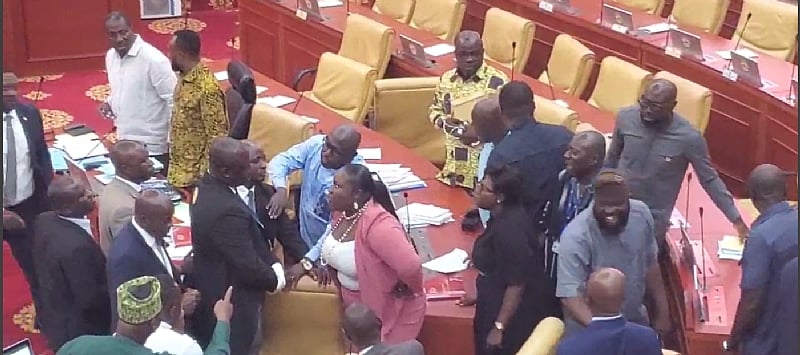The Ghanaian Parliament devolved into chaos on Tuesday, June 10, 2024, following a heated confrontation between the Minority and Majority caucuses. The catalyst for the disruption was the Minority’s attempt to address the ongoing strike by the Ghana Registered Nurses and Midwives Association (GRNMA), a pressing national issue that has significantly impacted healthcare delivery across the country. Dr. Ayew Afriyie, the Ranking Member on the Health Committee, sought to deliver a statement on the strike, aiming to raise concerns, propose solutions, or express solidarity with the striking nurses and midwives. However, his efforts were thwarted by First Deputy Speaker Joseph Osei-Owusu, who refused to admit the statement. This seemingly procedural decision ignited a firestorm of dissent from the Minority side.
Dr. Afriyie’s persistence in demanding recognition to speak on the GRNMA strike further escalated the situation. His refusal to yield to the Speaker’s decision to disallow the statement was interpreted as a challenge to the authority of the chair, adding fuel to the already tense atmosphere. The Speaker, in response, invoked his power to maintain order and directed the Parliamentary Marshal to remove Dr. Afriyie from the chamber. This directive proved to be the tipping point, triggering a vociferous reaction from the Minority MPs. They perceived the Speaker’s action as an infringement upon their right to represent their constituents and address critical national issues.
The Minority’s response was swift and disruptive. MPs rose from their seats in protest, engaging in vocal demonstrations of dissent. Chants filled the chamber, drowning out any attempts to restore order. The escalating unrest quickly transformed the parliamentary proceedings into a chaotic spectacle, far removed from the decorum expected of the legislative body. The scene became increasingly unruly, with accusations and counter-accusations flying between both sides of the aisle. Tempers flared, further exacerbating the already volatile situation.
Amidst the pandemonium, the Speaker’s efforts to regain control proved futile. The cacophony of voices and the general unrest rendered communication and deliberation impossible. With the situation spiraling out of control, the Speaker was left with no choice but to abruptly adjourn the sitting. This sudden adjournment underscored the gravity of the impasse, leaving the immediate future of parliamentary business uncertain. The unresolved conflict regarding the GRNMA strike loomed large, casting a shadow over the Parliament’s ability to function effectively.
The abrupt adjournment left the issue of the GRNMA strike unaddressed, further compounding the concerns of the striking healthcare professionals. The nurses and midwives had embarked on the industrial action to protest various grievances, including poor working conditions, inadequate remuneration, and a lack of essential resources. Their strike had already placed a strain on the healthcare system, leading to disruptions in service delivery and raising concerns about patient care. The Parliament’s inability to address the strike due to the internal standoff only deepened the crisis and raised questions about the government’s responsiveness to the healthcare workers’ demands.
The events of Tuesday, June 10, highlighted the deep divisions within the Ghanaian Parliament and the challenges in navigating contentious issues. The standoff over the GRNMA strike exposed the underlying tensions between the Minority and Majority parties, revealing the fragility of parliamentary decorum and the potential for disruptions when disagreements escalate. The unresolved nature of the conflict and the abrupt adjournment left the Parliament in a state of uncertainty, with the path forward unclear. The incident underscored the critical need for constructive dialogue, compromise, and respect for parliamentary procedures to ensure the effective functioning of the legislature and its ability to address pressing national concerns. The fallout from this chaotic episode is likely to have lasting implications for the relationship between the two sides of the house and the public’s perception of the Parliament’s effectiveness in fulfilling its mandate.


